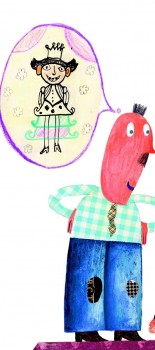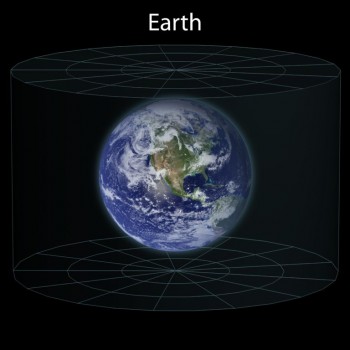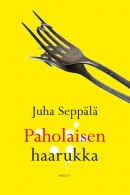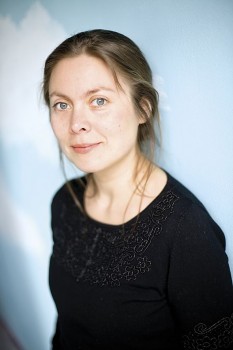Search results for "lola rogers/www.booksfromfinland.fi/2012/04/movies-and-mores/2010/02/let-us-eat-cake"
Art or politics?
16 February 2012 | This 'n' that
You’re going about your business in Helsinki Railway Station on a cold winter’s day — waiting for your train, buying tickets or newspapers or just taking short-cut through the building to keep warm – when suddenly the bloke next to you bursts into song. And not just him: along with a couple of dozen others, he makes the air ring with the patriotic song Finlandia, sung in harmony and perfectly in tune. (The video can be viewed at http://www.youtube.com/watch?v=wO63xt2jWtc) More…
Once upon a time
27 February 2014 | Children's books, Fiction
 Stories from Kirahviäiti ja muita hölmöjä aikuisia (‘The giraffe mummy and other silly adults’, Teos, 2013), illustrated by Martina Matlovičová. Interview of Alexandra Salmela by Anna-Leena Ekroos
Stories from Kirahviäiti ja muita hölmöjä aikuisia (‘The giraffe mummy and other silly adults’, Teos, 2013), illustrated by Martina Matlovičová. Interview of Alexandra Salmela by Anna-Leena Ekroos
The monkey princess
Adalmiina’s life was not an easy one. Her parents decided to prepare her for her career as a princess when she was a little girl: when Adalmiina was three she was sent to ballet school, at four she started taking lute lessons and at five she went on a course in magic-mirror gazing.
When Adalmiina turned six, she received a giant suitcase full of princess clothes and shoes.
‘Put them on, darling, we want to see you in all your lovely beauty!’ her mother sparkled, waving a muslin veil.
‘I want to go to the jungle!’ Adalmiina demanded. ‘Without any clothes!’
‘Will we have to force you to dress in all your glory?’ her parents snapped.
‘You’ll have to catch me first!’ Adalmiina announced, running into the garden. More…
Wolf-eye
30 June 2004 | Archives online, Fiction, Prose
Extracts from the novel Käsky (‘Command’, WSOY, 2003). Introduction by Jarmo Papinniemi
Only once he had led the woman into the boat and sat down in the rowing seat did it occur to Aaro that it might have been advisable to tie the woman’s hands throughout the journey. He dismissed the thought, as it would have seemed ridiculous to ask the prisoner to climb back up on to the shore whilst he went off to find a rope.
It was a mistake.
After sitting up all night, being constantly on his guard was difficult. Sitting in silence did not help matters either, but they had very few things to talk about. More…
A toast before dying
30 June 2005 | Archives online, Fiction, Prose
Extracts from the novel Voin jo paljon paremmin. Tšehov Badenweilerissa (‘I already feel much better. Chekhov in Badenweiler’, Loki, 2004). Introduction by Hannu Marttila
I went to meet them Friday and I did not plan to take other patients that week. They had a small but comfortable room with striped wallpaper.
The Russian was a tall man, but stooped. It soon became apparent that his wife spoke fluent German because she was of German descent. That made it much easier to take care of things.
Of course I knew who the patient was. I have always enjoyed literature and other forms of art. I could play several pieces rather well on the piano. When I was younger I had even written a couple of stories set in the mountains, though I had never offered them for publication. As for Chekhov, I had read a couple of his stories that had just come out in German translation, and I had liked them quite a lot in a way, even though they of course reflected that characteristic Russian nature, with its vodka and untidiness.
The patient’s wife seized both my hands when I entered. It was a bit confusing, but not necessarily unpleasant.
‘Our name is Chekhov. We have come from Russia,’ the woman said in a strong, carrying voice. ‘I trust you’ve been told?’ More…
The funeral
31 December 1988 | Archives online, Fiction, Prose
Hannu Salama’s short story Hautajaiset (‘The funeral’) – taking place in Pispala, Tampere – in the volume Kesäleski, ‘Summer widow’, was published in 1969. Introduction by Pekka Tarkka
On Tuesday Venla came round: as Sulo was being lowered into the grave Vihtori had had a heart attack. The next day a letter arrived from father: funeral on Sunday, and Gunilla and Timo want you to speak at the grave. I telegraphed back: ‘Vikki too close to me. Unable to speak.’ Outside the post office I realised I could have sent fifty words for the same money.
Irma ordered a flower arrangement. Did I want to put an inscription? Part of the last stanza of a revolutionary song went through my head:
Sowing makes the corn come into ear:
Hundredfold higher that happier age will be.
I said not to put anything, I’d say something at the grave if it seemed the thing to do. I told her to put mother’s, father’s and Heikki’s names on, and we’d take these off if they’d sent their own wreath. More…
Is this all?
10 October 2013 | Extracts, Non-fiction

Earth. Andrew Z. Colvin/Wikimedia
In today’s world, many people find that it is not the lack of something that is problematic, but excess: the same goes for knowledge. According to professor of space astronomy, Esko Valtaoja, knowledge should contribute to the creation of a better world. His latest book is a contribution to the sum of all knowledge; over the course of two hundred pages Valtaoja delves deep into the inner space of man by taking his reader on a brief tour of the universe. Extracts from Kaiken käsikirja. Mitä jokaisen tulisi tietää (‘A handbook to everything. What everybody should know’, Ursa, 2012)
Whatever god you bow down to, you’re probably worshipping the wrong god.
The above is almost the only completely certain thing that can be said about religion, and even it does not encompass any deep truth; it’s just a simple mathematical statement. The world’s biggest religion is Roman Catholicism, which is confessed, at least nominally, by 1.1 billion people. If the Roman Catholic god were the true god, the majority of people in the world are therefore worshipping a false god. (According to the official stance of the Catholic church, the other Christian denominations are heresies, and their believers will be condemned to perdition: extra ecclesiam nulla salus. This inconvenient truth is, understandably, politely bypassed in ecumenical debate. But even if all those who call themselves Christians were counted as worshipping the same god, two thirds of the world’s population are still knocking at the wrong door.)
If you’re a religious person, don’t worry; I’m not blaspheming. And if you’re a campaigning atheist, hang on a minute: all I want to do is to find a clear and undisputed starting point to consider what it is we’re talking about when we speak of religion. More…
Me and my shadow
Hotel Sapiens is a place where people are made to take refuge from the world that no longer is habitable to them; the world economy has fallen – like the House of Usher, in Edgar Allan Poe’s story – and with it, most of what is called a civilised society. A rapid synthetic evolution has taken humankind by surprise, and the world is now governed by inhuman entities called the Guardians. ‘Kuin astuisitte aurinkoon’ (‘As if stepping into the sun’) is a chapter from the novel Hotel Sapiens ja muita irrationaalisia kertomuksia (‘Hotel Sapiens and other irrational tales’, Teos, 2012), where several narrators tell their stories
The fog banks have dissipated; the sky is empty. I cannot see the sails or swells in its heights, nor the golden cathedrals or teetering towers. I would not have believed I could miss a fog bank, but that’s exactly what it’s like: its disappearance is making me uneasy. For all its flimsiness and perforations it was our protection, our shield against the sun’s fire and the stars’ stings. Now the relentlessly blazing sun has awakened colours and extracted shadows from their hiding places. The moist warmth has dried into heat and the Flower Seller’s herb spirals have dried up into skeletons. The leaves on the trees are full of bronze, sickly red and black spots. Though there is no wind and autumn is not yet here, they come loose as if of their own volition, as if they wanted to die.
This morning, as I was strolling up and down the park path as usual, I saw another shadow alongside my own.
– Ah, you’re back! I said. – I wondered what had happened to you after you lost your shadow; how did you manage to change into your own shadow yourself? More…
Temporarily out of order
Extracts from the novel Hullu (‘The lunatic’, Teos, 2012). Introduction by Soila Lehtonen
I found myself standing in front of the noticeboard. The rules were on a sheet of paper:
Ward 15 5-C
MEAL TIMES:
Breakfast 8:00 AM
Lunch 11:45 AM
Dinner 4:30 PM
Evening Snack 7:30 PM
COFFEE:
After lunch
We recommend leaving money, valuables, and bankbooks for storage in the ward valuables locker. We take no responsibility for items not left in the locker! Money may be retrieved 1–3 times per day. Use of mobile phones on the ward by arrangement.
VISITING HOURS:
M–F 2–7 PM
Sa–Su 12–7 PM
PERSONAL CLOTHING:
Use of one’s own clothing by individual arrangement. Clothing care individual. Washer and dryer available for use in the evenings after 6 PM.
OUTDOOR RECREATION:
Arranged individually according to health condition. Outdoor pass does not include the right to leave the area.
VACATIONS:
Vacations arranged during morning report, according to health condition.
NOTA BENE!
Smoking is only allowed on the smoking balcony! Smoking prohibited from 11 PM to 6 AM.
Pastor Karvonen available by appointment.
These were impossibly difficult rules. I read them through three times and simply did not understand. ‘Clothing care individual.’ ‘Outdoor pass does not include the right to leave the area.’
What did these sentences mean? With whom did you schedule the pastor and how? And why? More…
When sleeping dogs wake
31 December 1994 | Archives online, Fiction, Prose
Extracts rom the novel Tuomari Müller, hieno mies (‘Judge Müller, a fine man’, WSOY, 1994). Introduction by Soila Lehtonen
In due course the door to the flat was opened, and a stoutish, quiet-looking woman admitted the three men, showed them where to hang their coats, indicated an open door straight ahead of them, and herself disappeared through another door.
After briefly elbowing each other in front of the mirror, the visitors took a deep breath and entered the room. The gardener was the last to go in. The home help, or whatever she was, brought in a pot of coffee and placed it on a tray, on which cups had already been set out, within reach of her mistress. The widow herself remained seated. They shook hands with her in tum. The mayor was greeted with a smile, but the bank manager and the gardener were not expected, and their presence came as a shock. She pulled herself together and invited the gentlemen to seat themselves, side by side, facing her across the table. They heard the front door slam shut: presumably the home help had gone out. More…
Poems
31 March 1983 | Archives online, Fiction, poetry

Claes Andersson. Photo: Johan Bargum.
Claes Andersson (born 1937) became, during the 1960s, one of the few authors to free themselves from the modernist tradition so firmly established in Finland-Swedish writing in the 1920s to create poetry of a more distinctly personal kind. Claes Andersson’s poems are coloured by his training as a psychiatrist; he uses technical language in which scientific terms are exploited as an expressive device. His work also sometimes contains black humour and an ironical element calculated to shock the reader; they reflect the contrast between the dream of beauty and love and the grim reality of evil . To date, Andersson has published eleven collections of poems and a considerable number of plays for the stage, cabaret and radio. He has also written three novels, the latest of which – entitled En människa som börjar likna sin själ (‘The person who began to resemble his soul’) – is to appear in the autumn of 1983. For an introduction to Claes Andersson’s work, see Thomas Warburton’s article in Books from Finland 3/1979. Claes Andersson’s poems have recently appeared in translation in Poetry East, Seneca Review, Scandinavian Review and Grand Street.
Loneliness
My love, the moments I spend
in your cunt I forget my
migraine aching joints drinking problem grand mal paralysis
hallucinations pain between the shoulderblades short-
ness of breath hiccoughs dandruff dry skin vertigo bedwetting
impaired hearing chafed lips pustules liver
spots leg sores bleeding gums flatulence
sciatica crying fits thoughts of suicide swol-
len ankles pathological thirst Angst baldness double
vision facial twinges difficulty concentrating
cross eyes burning in the urethra running ears ring
ing ears cramps throat pain itching allergies
strange subcutaneous lumps cold hands nail-
biting hoarseness obesity jealousy vomiting
constipation sleeplessness noctural crying fits
failing memory pus in each nasal sinus and gout.
From Rumskamrater (‘Roommates’), 1974)
Scenes from a life
30 September 2004 | Archives online, Fiction, Prose
Extracts from Muistelmat (‘Memoirs’, Otava, 2004). Introduction by Soila Lehtonen
1973, Mietoinen
The shot put circle
Great Grandma knew a lot. She could look over to the neighbor’s yard two kilometers away and told us she could see a broom there leaning against the door. I was practicing the shot-put with the boys by the gable end of the barn. The shot flew three meters. Great Grandma walked past: ‘So what are you boys up to?’ I stared at the ground and said: ‘We don’t know yet.’
1980, Turku
The people in the neighboring car
Reeds rustled against the sides of the boat. The car stood in the sun. We drove into town. At the end of the trip, traffic slowed. I sat in the back seat and got a good view of the people in the car next to us. When we started moving again, I knew I would never see them again. After thirty seconds, they were there, right next to us. More…
Juha Seppälä: Paholaisen haarukka [The Devil’s fork]
30 December 2008 | Mini reviews
 Paholaisen haarukka
Paholaisen haarukka
[The Devil’s fork]
Helsinki: WSOY, 2008. 267 p.
ISBN 978-951-0-34534-4
€ 32, hardback
Seldom does a novel manage to be as topical as Juha Seppälä’s latest – his tenth – which portrays a great economic crisis and the people who are dragged along with it. Seppälä has written lines for his characters where they claim that a novel is only able to depict a reality that existed years ago – but Paholaisen haarukka proves this is not true. More…
Online, offline?
17 April 2014 | Articles, Non-fiction

‘The bookworm’ (old-fashioned) by Carl Spitzweg, ca. 1850. Museum Georg Schäfer. Photo: Wikimedia
Ebooks are not books, says Teemu Manninen, and publishers who do not know what marketing them is about, may eventually find they are not publishers any more
At least once a year, there is an article in a major Finnish newspaper that asks: ‘So, what about the ebook?’ The answer is, as always: ‘Nothing much.’
It’s true. The revolution still hasn’t arrived, the future still isn’t here, the publishers still aren’t making money. In Finland, the ebook doesn’t seem to thrive. The sales have stagnated, and large bookstores like the Academic Bookstore are closing their ebook services due to a lack of customers.
Why is Finland such a backwater? Why don’t Finns buy ebooks?
The usual explanation is that Finland is a small country with a weird language, so the large ebook platforms like Amazon’s Kindle and Apple’s iBook store have not taken off here. Another patsy we can all easily blame is the government, which has placed a high 24% sales tax on the ebook. If that isn’t enough, we can always point a finger at the lack of devices and applications or whatever technical difficulty we can think of. More…

